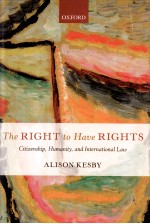

THE RIGHT TO HAVE RIGHTS:CITIZENSHIP HUMANITYPDF电子书下载
- 电子书积分:9 积分如何计算积分?
- 作 者:AND INTERNNATIONAL LAW
- 出 版 社:OXFORD UNIVERSTY PRESS
- 出版年份:2012
- ISBN:0199600821
- 页数:164 页
Introduction 1
1. Arendt and the right to have rights 2
2. Structure of the book 6
2.1 A'place in the world' 6
2.2 The subject of rights 8
2.3 Chapter descriptions 8
1. The Right to have Rights as a 'Place in the World' 13
1. Nationality and emplacement: a 'place in the world' and the international legal order 15
1.1 Entry as the national's return 16
1.2 Questioning the national's place: not all nationals are 'in place' 21
2. Humanity and emplacement: place and relationships 23
2.1 The right to enter one's 'own country': a relational perspective 24
2.2 Emplacement and the right to respect for family and private life 25
2.3 Non-refoulement 28
3. Non-nationals and exclusion: the'non-place'of containment 31
4. Conclusion 38
2. The Right to have Rights as Nationality 39
1. The formal or thin conception: the right to a nationality as aquestion of international public order 40
1.1 Nationality and citizenship 43
2. The human rights orientation: nationality as an instrument for the protection of rights 47
2.1 The right to a nationality: curtailing state discretion in the regulation of nationality 48
2.2 Nationality and the protection of human rights 51
2.3 Diplomatic protection 53
2.4 Nationality as eclipsing humanity? 55
3. The democratic governance orientation: the right to a nationality as essential for democratic governance 57
4. The substantive belonging orientation: the right to a nationality and substantive membership 60
5. Conclusion 65
3. The Right to have Rights as Citizenship 67
1. The right to vote in international human rights instruments 69
2. Citizenship and deviancy 71
3. Looking beyond prisoner disenfranchisement: an Arendtian perspective? 77
4. Citizenship, deviancy, and 'race' 80
5. Citizenship, deviancy, and 'social exclusion' 85
6. Conclusion 90
4. The Right to have Rights as Humanity 92
1. The individual as the subject of human rights 93
2. The human transcends the citizen 97
3. Internal borders: humanity imperilled? 101
4. The undocumented migrant as the human: questioning internal borders 104
5. The borders of international human rights law 108
6. The border dividing national law and international human rights law: the human as the deportable alien 111
7. Conclusion 116
5. The Right to have Rights as the Politics of Human Rights 118
1. Arendt: the problem of the paradox of human rights 119
2. Ranciere: the subject of rights as the subject of politics 120
2.1 Lodging a dispute: asserting and verifying equality 124
2.2 The assumption of equality 127
2.3 The limitless and open spectrum of the subject of rights 128
2.4 The contingency of the present order 128
2.5 The agency of Ranciere's politics vbiopolitics 130
3. The limits of Ranciere's subject of rights 131
4. Ranciere and human rights law 133
4.1 The limits of human rights law 133
4.2 The emancipatory potential of human rights law 136
4.3 The politics of practice 139
5. Conclusion 140
Conclusion 142
1. The right to have rights and the problem of naming 142
2. Un-naming the placeholder: the right to have rights as a gesture of delegitimation 145
References 149
Index 161
- 《竞争战略 全译珍藏版》(美)迈克尔·波特(Michael E. Porter)著 2012
- 《网络互联技术手册 第2版》(美)(K.唐斯)Kevin Downes等著;包晓露等译 1999
- 《新版交换式以太网和快速型以太网 第2版》(美)(R.布雷耶)Robert Breyer,(美)(S.赖利)Sean Riley著;肖文贵等译 1997
- 《摄影100关键词》(英)克拉克著 2011
- 《守望百年 中英文对照爱情长诗》蔡丽双著;张智中译 2014
- 《环境政策概要》(英)卡罗琳·斯奈尔(Carolyn Snell)著;宋伟译 2017
- 《驼铃 中-英-波兰文对照诗集》蔡丽双著;张智中,(波兰)博古米娜·雅尼卡译 2015
- 《爱海情帆 中-英-罗马尼亚文对照爱情长诗》蔡丽双著;张智中,德拉戈斯·巴尔布译 2016
- 《准备,开始,哎哟》(美)弗兰·马努斯肯著;(美)黛安娜·帕尔米西若绘;魏亚西译 2014
- 《埋藏在后院》(美)盖尔·赫尔曼著;(美)杰里·斯马斯绘;筱舟译 2014
